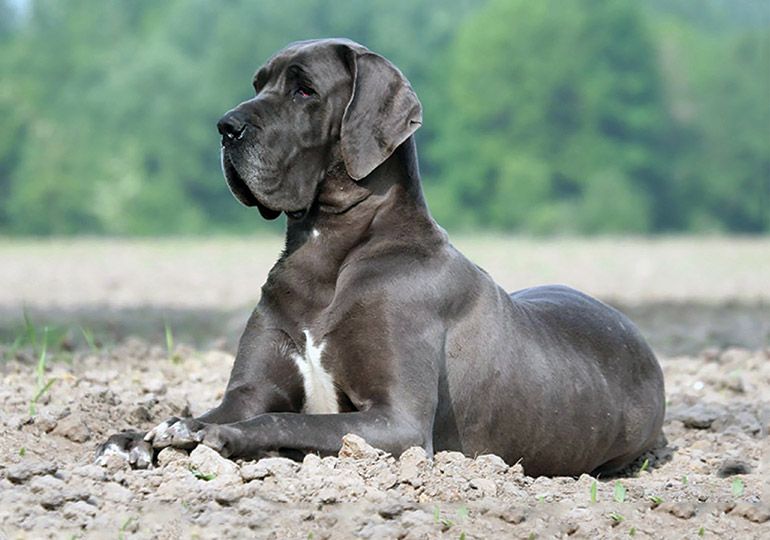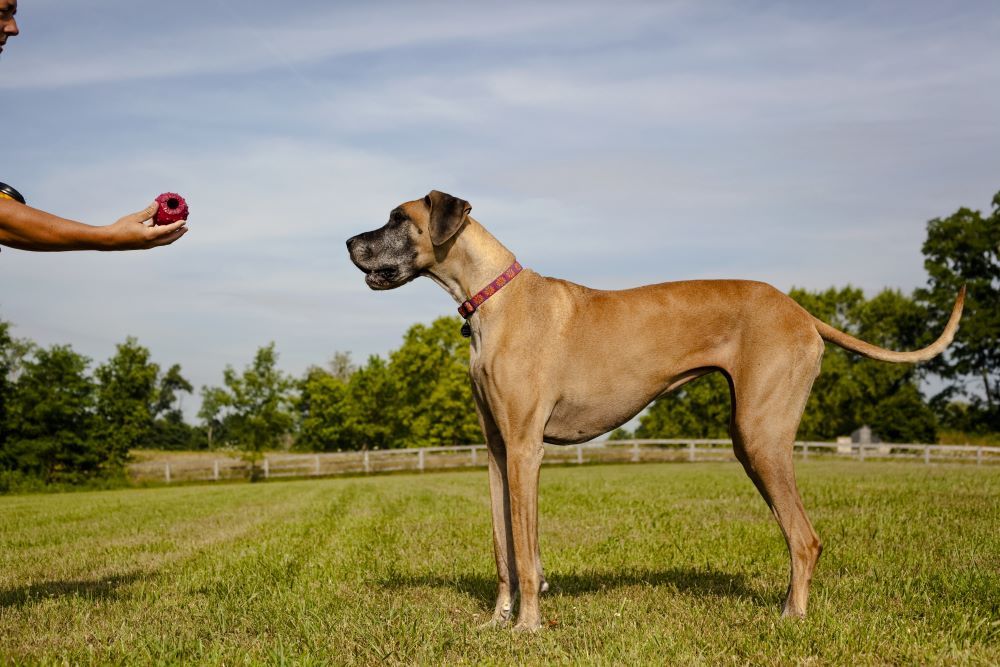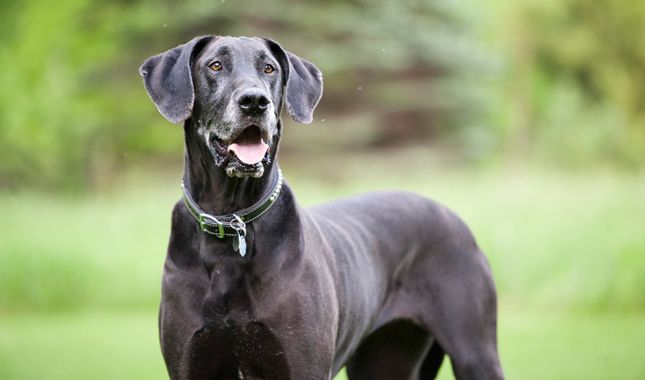Great Danes are a breed of dog that are known for their impressive size and gentle nature. However, many people wonder if these dogs are protective of their owners. While Great Danes are not typically bred to be guard dogs, they do have many protective qualities that make them great family pets.
One of the most notable protective qualities of Great Danes is their appearance. Their sheer size can be intimidating to strangers, and their deep bark can also act as a deterrent. Additionally, Great Danes have a patient and calm demeanor that can make them excellent watchdogs. They are not typically aggressive, but they will alert their owners to any potential threats.
Despite their protective qualities, Great Danes are not necessarily the best choice for a guard dog. While they may be able to intimidate strangers with their size and bark, they are not typically aggressive enough to take on a true intruder. However, with proper training and socialization, Great Danes can be trained to be protective of their owners and their home.

Great Dane: An Overview
Great Danes are known for their imposing size and regal appearance. They are one of the largest dog breeds in the world, standing at an impressive 28 to 34 inches tall at the shoulder and weighing between 140 to 175 pounds. Their heavy, muscular build and deep chest give them a powerful and imposing presence.
Great Danes come in a variety of colors, including black, blue, fawn, and harlequin. Their coat is short and sleek, requiring minimal grooming. Despite their intimidating size, Great Danes are gentle giants with a kind nature and loyalty.
While Great Danes are not typically aggressive, they do have strong protective instincts. They are known to be excellent watchdogs, and their size alone can be a deterrent to potential intruders. Great Danes are also fiercely loyal to their families and will do whatever it takes to protect them.
Overall, Great Danes make excellent pets for those who are willing to commit to their unique needs. They require plenty of exercise and socialization to keep them healthy and happy. With proper training and care, Great Danes can be loving and loyal companions for years to come.
Personality and Temperament
Great Danes are often referred to as "gentle giants" due to their massive size and affectionate nature. They are known for their calm demeanor and natural temperament, making them great family pets. Despite their size, they are generally very gentle and playful dogs who love to interact with their owners.

Great Danes are also known for their protective instincts. While not all Great Danes are naturally protective, some may exhibit protective behavior towards their owners. This protective behavior can be influenced by genetics, socialization, and training.
In terms of personality, Great Danes are typically friendly and outgoing with people they know. They are known for their affectionate nature and love to be around their owners. They are also generally very patient and tolerant with children, making them great family pets.
However, it is important to note that Great Danes require proper socialization and training to ensure they exhibit appropriate behavior. Without proper socialization, they may become timid or aggressive towards strangers or other dogs.
Overall, Great Danes have a confident and calm temperament, making them great companions for families who are willing to provide them with the proper care and training they require.
Training and Socialization
Great Danes can be protective of their owners, but proper training and socialization are essential to ensure that their protective behavior is appropriate and not aggressive. As with any dog, early socialization is crucial to ensure that the Great Dane is comfortable around people and other animals.

Obedience training is also important for Great Danes. Positive reinforcement is the most effective training method for this breed. Using treats and praise to reward good behavior can be very effective. Consistency in training is also key, as Great Danes respond well to a routine.
Boundary training can also be helpful for Great Danes. Establishing boundaries for where the dog is allowed and not allowed to go can help prevent destructive behavior and keep the dog safe. Discipline should be used sparingly and should never involve physical punishment.
It is important to note that Great Danes are generally easy to train and are highly trainable. However, they can be stubborn at times, so patience and persistence are necessary.
Overall, proper training and socialization can greatly influence a Great Dane's behavior and can help shape their protective behavior towards their owners in a positive way.
Protective Instincts and Behavior
Great Danes are known for their protective instincts and behavior. While genetics play a role in a dog's behavior, it's important to remember that individual temperament and training also have a significant impact.

Great Danes have a strong sense of loyalty and love for their families, which can translate into protective behavior. They are often described as alert and watchful, making them good watchdogs. However, being a good watchdog does not necessarily mean they will be good guard dogs.
Guard dogs are trained to protect property or people, while watchdogs are trained to alert their owners of potential danger. Great Danes can function as both watchdogs and guard dogs, but it's important to note that not all Great Danes have the temperament or training to be effective guard dogs.
Territorial instincts also play a role in a Great Dane's protective behavior. They may see their home and family as their territory and will defend it if they perceive a threat. However, it's important to socialize Great Danes from a young age to prevent them from becoming overly territorial and aggressive towards strangers.
Great Danes can also be trained as personal protection dogs. These dogs are trained to protect their owners from physical harm and can be used for personal security. However, not all Great Danes are suitable for this type of training, and it's important to work with a professional trainer to ensure the dog's safety and effectiveness.
In summary, Great Danes have protective instincts and behavior, but individual temperament and training play a significant role in their effectiveness as guard dogs or personal protection dogs. Socialization is important to prevent aggression towards strangers, and professional training is necessary for dogs trained for personal protection.
Physical Activity and Exercise
Great Danes are a large and energetic breed that require regular physical activity to maintain their health and well-being. They have a moderate activity level and require daily exercise to prevent boredom, obesity, and destructive behavior.
A Great Dane needs at least 30-60 minutes of exercise every day, which can include walks, jogs, playtime in a fenced yard, or other activities that get them moving. They also thrive on mental stimulation, so incorporating training and interactive games into their exercise routine can be beneficial.
It's important to note that Great Danes should not be over-exercised, especially when they are young and their bones are still developing. Jumping, running on hard surfaces, and strenuous exercise should be avoided to prevent joint problems and other health issues.
Due to their size, Great Danes need plenty of space to move around and play. They may not be suitable for apartment living, but they can adapt to smaller living spaces as long as they get enough exercise and attention. A fenced yard is ideal for Great Danes to run and play safely, but it's important to ensure that the fence is secure and tall enough to prevent them from escaping.
Overall, regular physical activity and exercise are essential for keeping Great Danes healthy, happy, and well-behaved. Owners should provide them with enough space and opportunities to move around, while also being mindful of their limitations and avoiding excessive exercise.
Health Concerns and Lifespan
Great Danes are generally a healthy breed, but like all dogs, they are prone to certain health problems. One of the most common health issues that Great Danes face is bloat, or gastric dilatation-volvulus (GDV). This is a life-threatening condition that can occur when the stomach fills with gas and twists on its axis. Great Danes are also prone to heart disease, including cardiomyopathy, which can also be life-threatening.
In addition to bloat and heart disease, Great Danes are also at an increased risk for cancer. Osteosarcoma, a type of bone cancer, is particularly common in this breed. Other health problems that Great Danes may face include hip dysplasia, arthritis, and other joint and bone diseases.
Despite their large size, Great Danes have a relatively short lifespan compared to smaller breeds. On average, they live between 8 and 10 years, with some living only 6 or 7 years, and a lucky few reaching the ripe old age of 12. It is important to be aware of the potential health problems that Great Danes may face and to take steps to help them live as long and healthy a life as possible. This may include regular veterinary check-ups, a healthy diet, and plenty of exercise.
Overall, while Great Danes can make excellent protective dogs, it is important to be aware of their potential health concerns and to take steps to ensure their well-being. By providing proper care and attention, Great Danes can live long, happy lives as loyal and protective companions.

Living with a Great Dane
Living with a Great Dane can be an enjoyable experience for those who appreciate the breed's imposing presence, loyalty, and love. However, there are certain things to consider when bringing a Great Dane into the home.
Firstly, Great Danes are known to be excellent family pets and are gentle with children. However, their large size means that they can accidentally knock over small children, so it is important to supervise interactions between them.
Secondly, Great Danes require a lot of space and exercise due to their size and energy levels. They are not suitable for small apartments or homes without a yard. A daily walk and playtime in a secure area is essential for their physical and mental well-being.
Thirdly, Great Danes can get along well with other pets if they are socialized from a young age. However, their prey drive can be strong, so it is important to supervise interactions with smaller animals such as cats and rabbits.
Fourthly, Great Danes are loyal and affectionate companions who thrive on human companionship. They do not do well when left alone for long periods of time and may become destructive or anxious.
Lastly, Great Danes have an imposing presence and can be intimidating to strangers. While they are not typically aggressive, their size alone can be a deterrent to potential intruders, making them a good choice for those looking for a dog to provide a sense of safety and security.
Overall, living with a Great Dane requires careful consideration of their needs and temperament. With proper care and attention, they can make excellent companions and protectors for those who appreciate their unique qualities.
Choosing the Right Breeder
When it comes to choosing a breeder for a Great Dane, it is important to do your research and find a reputable breeder who prioritizes the health and well-being of their dogs. A good breeder should be able to provide you with information about the puppy's parents, including their health history and any genetic testing that has been done.
One way to find a reputable breeder is to look for breeders who are registered with the American Kennel Club (AKC). The AKC is a trusted organization that sets standards for breeding practices and requires breeders to adhere to certain guidelines.
It is also important to visit the breeder in person and see the conditions in which the puppies are being raised. A good breeder will have clean and spacious facilities and will allow you to interact with the puppies and their parents.
Once you have found a reputable breeder, it is important to work with them to ensure that your puppy receives proper training. This may include working with a professional dog trainer to teach your puppy basic obedience commands and socialization skills.
Overall, choosing the right breeder is crucial to ensuring that your Great Dane is healthy, well-behaved, and a loyal companion for years to come.




